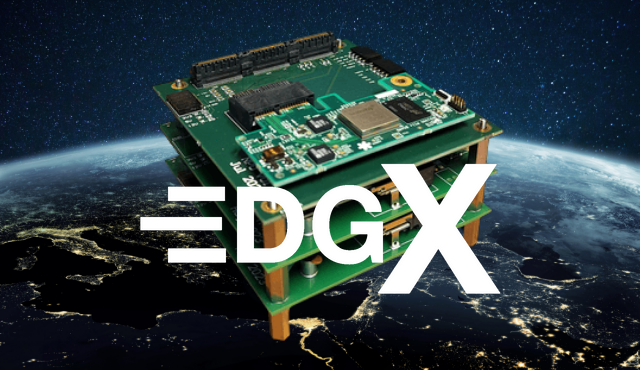Edging into Space
by Nick Destrycker, Founder and CEO at EdgX.
Almost anyone who has been a sci-fi fan over the past 50 years would instantly recognize one of the most iconic TV openings of all time – “Space, the final frontier.”
This indelible phrase ignited the imagination of many who saw the potential of what lies beyond our atmosphere. Now, in 2023, we’ve found ourselves in a new space race with renewed interest in everything from space tourism to new manned visits to the moon, to frequent launches of satellite payloads.
While upcoming lunar landings gain the most media attention, it is the development of next-generation satellite networks that will most impact mankind remaining here on Earth.
Imagine a world where thousands of interconnected satellites are providing support for fundamental services like global navigation, weather forecasting and high-speed communication powered by next-generation AI technology to push the boundaries of what is possible.
In response to the rapidly growing amount of data generated in the space industry, EDGX recognized the opportunity to leverage artificial intelligence in satellites to ensure that they can evolve, adapt, and keep up with the pace of innovation. We also recognized that, whether enhancing 5G/6G non-terrestrial networks, enabling real-time object recognition, disaster response and rapid data processing for Earth observation, or accelerating rapid data processing for real-time in-orbit object manipulation, the demand for AI in space applications required a solution which is hyper-efficient, very compact and yet compellingly powerful, which drove us to focus on using neuromorphic principles because the brain is the most efficient inference and learning engine.
That’s where BrainChip comes in. Their event-based neuromorphic technology gives us the efficiency we are looking for to develop disruptive data-processing solutions for space.
The EDGX data processing units leverage BrainChip’s neuromorphic capabilities to enable event-driven, onboard learning that is energy efficient, low latency and modular to overcome the challenges faced in the dynamic and challenging environments of space. As part of the EDGX-1’s DPU architecture, BrainChip can allow the platform to naturally support continual learning in ML models.

Through BrainChip’s neuromorphic capabilities, which are designed to mimic the neural structure of the brain, computations can be performed much faster and more efficiently than traditional computing platforms. This integration of brain-inspired technology into the EDGX-1 DPU enhances the system’s ability to handle AI applications that require real-time processing, low power consumption and high data bandwidth.
Communication satellites are yearning for increased flexibility and autonomy. Radio resources, such as bandwidth and transmission time must be thoughtfully assigned. Decisions will have to be made locally, in real-time, very efficiently, and very quickly – all of which are critical in these environments.
akida™’s ability to learn online and onboard also allows us to handle the complex and changing environment of Low Earth Orbit.
EDGX-1 aims to solve multiple onboards AI challenges
- Meeting the power budgets of microsatellites and CubeSats: By integrating neuromorphic computing to augment FPGA and SoC subsystems, such as Nvidia embedded devices.
- Availability: By paying attention to critical system availability and reduced reboot times and appropriate error correction handling.
- Improved reliability: By integrating COTS processing units that perform reliably in high-radiation environments into a platform that isolates radiation induced upsets.
- In-orbit flexibility, adaptability, and AI retrainability: The EdgX-1 ensures model adaptability through autonomous retraining onboard, reducing reliance on ground intervention and thereby enhancing mission performance.
Our goal was to make AI ubiquitous in space, and we share that broader goal with BrainChip. By using neuromorphic technology. We can bring unprecedented capabilities in space, not to “go where no one has gone before,” but to “enable services that no one has seen before.”
Stay tuned.




